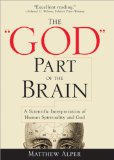 Claire's Original Art Greeting Cards
There is nothing that says I care like a real snail-mail greeting card!
Click on a picture above for a plain-paper printable greeting card pdf.
Print on regular 8.5 by 11 printer paper. Fold twice so that the art is on the front and the title and copyright are on the back.
Write your greeting on the inside.
Mail in an A2 Invitation Envelope.
Claire's Original Art Greeting Cards
There is nothing that says I care like a real snail-mail greeting card!
Click on a picture above for a plain-paper printable greeting card pdf.
Print on regular 8.5 by 11 printer paper. Fold twice so that the art is on the front and the title and copyright are on the back.
Write your greeting on the inside.
Mail in an A2 Invitation Envelope.The Godless Part of the Brain: A not very Scientific Interpretation
July 23rd, 2008 · No Comments

The “God” Part of the Brain: A Scientific Interpretation of Human Spirituality and God . . . and a Personal Journey (2006, originally published 1996) by Matthew Alper is an essay, really, and it’s hardly scientific. Rather the book is a general and incomplete survey of religious practice and persecution undertaken by the author ostensibly to discover for himself whether there is a God, a subject of interest to him because he knows that he will, one day, die.
I’ve never understood where people get the notion that religion is necessary to the human race because we’re the only species that knows from an early age that we will die. (Where is the evidence that no other animal knows this?) I don’t get the connection anymore than I get “original sin” and I’m not any closer having read Alper’s book on the subject.
Alper is looking for the God part of the brain, but as far as I can tell he hasn’t even read Julilan Jaynes. (Richard Dawkins has and comments on Jaynes in The God Delusion (pages 350-351) “Jaynes even located the voices of the gods in the opposite hemisphere if the brain from the one that controls audible speech.” (page 351). Jaynes’s gods are the voices we all hear in our heads, voices that we recognize now as our own. Jaynes believed that until approximately 1000 years BC, people believed these voices were the voices of various gods.) Now you may not think Jaynes is right, but he puts forth a well laid argument on Alpers subject matter, and his argument is interesting.
Back to Alper. I found little logic and even less science in argument. Two examples:
Where’s the science in Alper’s interpretation of the group dynamic effect on “survival of the fittest”? (He goes down this route looking for guilt and morality.) He tells the reader that “Among the social animals, rather than a species’ gene pool getting stronger with each passing generation, it now remained stagnant.” (Page 211, mixed verb tenses his.) Alper doesn’t ask if group dynamics might bias the gene selection for something besides “fitness,” something like cooperation.
Alper’s arguments run like those of creationists: It is, because there’s no other explanation. “Because we instinctively believe in the existence of such supernatural forces who possess both the power as well as the inclination to assist us, we are compelled to pray to these forces. Because we instinctively believe . . .” (Page 166) Two sentences in a row begin “Because we instinctively believe.” My instinct tells me there no logic here.
Imagine my surprise when I got to the end and Alper proclaims himself, it would seem, and agnostic. “If it’s true that there is no spiritual reality, no God, no soul, and no afterlife, then let’s accept ourselves for what we are and make the most of it.” (page 247)
OK, Dear Reader, this is the last time I’ll bother to review a book I think is drivel.
Tags: Emotional Freedom · Non Fiction







0 responses so far ↓
There are no comments yet...Kick things off by filling out the form below.
Leave a Comment